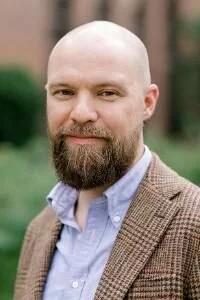The ancient Greek philosopher Thales believed, at least according to Aristotle, that everything is water.
More precisely, he believed that water was the material principle underlying all things—“that of which all things consist, from which they first come and into which on their destruction they are ultimately resolved.”Aristotle, Metaphysics 1.983b
His rationale for this belief isn’t as implausible as one might think: Thales observed that matter was able to transform into things: heat could transform metals into a liquid, for example. And Thales also realized that water was able to be transformed into three different states—vapor, liquid, and solid—with But what about human persons? Are humans ultimately physical beings without remainder?considerably more ease than other materials. When you add to these observations the assumption that water could generate into earth (a belief not disproven until the 18th century), the idea becomes, if not quite plausible to modern ears, at least a little less starkly counterintuitive than the first impression suggests.
Nevertheless, you’re unlikely to bump into a coworker who is staunchly committed to a Thalean view of the world. But the odds of sharing a lunch table with someone with a parallel view—the belief that everything is ultimately physical, or more precisely, everything ‘supervenes’ on the physical—are pretty good.
There are obvious ways that this belief contradicts traditional Christian commitments: God, for example, isn’t physical. But what about human persons? Are humans ultimately physical beings without remainder?
Joshua Farris, Assistant Professor of Theology at Houston Baptist University, thinks not.
The Soul in Decline
“Substance dualism (i.e., the view that humans are souls with bodies, or embodied souls) has had remarkable staying power in the history of Christian thought, specifically, and the history of religious thought more generally,” Farris says. “However it has become less popular recently in academic circles. This is true not only in philosophy, particularly philosophy of mind (with the emphasis on questions about the constitution of humans), but also in the social sciences, history, psychology, cognitive science, and literature departments.”
Farris notes that there are good historical reasons for this: “With the rise of science and its success in explaining the physical world, there certainly seems to have been a shift toward thinking about the world through the lens of the empirical sciences. That in itself is not necessarily a problem, but there is and has been a growing perception that science provides answers where philosophy and religion, with their appeals to what one might call ‘spooky’ entities, have not.”
Not only has belief in immaterial souls been critiqued in fields such as philosophy and cognitive science, a number of biblical scholars and theologians have questioned whether the biblical text actually requires such a belief. Often these alternative accounts attribute belief in immaterial souls to the specter of Platonism haunting early Christian forms of thought; others argue that traditional accounts of the soul imply a denigration of the importance of the body that runs afoul of the biblical creation account.
The Soul Reconsidered
In spite of its spookiness, substance dualism is making a comeback. For one thing, science is uncovering a world that’s quite a bit spookier than previous generations had supposed.The current frontrunner for ‘spookiest phenomenon’ being quantum entanglement. More importantly, a number of powerful arguments have been advanced in the philosophical literature that defend substance dualism, with figures like Richard Swinburne, John Foster, and Alvin Plantinga leading the way.
Informed by this previous work, Farris has recently mounted a case for substance dualism in The Soul of Theological Anthropology: A Cartesian Exploration, a book hailed by one reviewer as “the newDuring his time at the Henry Center he’ll be building off his previous work through engagement with recent discussions in the science and religion literature, most notably on the origin of the soul and the Imago Dei. leader in the field for a theological defense and construction of a substance dualist anthropology and doctrine of the intermediate state.”James T. Turner, “Review of The Soul of Theological Anthropology: A Cartesian Exploration,” Journal of Biblical and Theological Studies 2, no. 1, 343. During his time at the Henry Center he’ll be building off his argument there through engagement with recent discussions in the science and religion literature, most notably on the origin of the soul and the Imago Dei.
“The most obvious area in which substance dualism has been left out of discussions is in the area of human origins,” Farris observes. “While a thriving area of reflection at the heart of theology and science, the literature on human origins has seen an almost overwhelming concern for the evolution of humans through genetic drift or some other mechanism and the development of human brains continuous with its animal ancestry in the brain sciences.” If humans are composed of two substances, body and soul, a scientifically informed theological anthropology has to be able to account for where the soul ‘comes from,’ so to speak. Are souls directly created by God? Or created by God through intermediate causes? Or do souls emerge from physical matter?
“Given the overwhelming rejection of immaterial substances in contemporary academic discussions, it is not a surprise that we see very little work and reflection on the origin of souls,” Farris notes. “This needs to change.” Farris thinks the best route to bringing about that change is to avoid holing up in our own respective disciplinary silos—a task, he admits, that is not always easy.
The Soul between the Disciplines
“To some degree, theological anthropology and the study of the doctrine of creation require, at a minimum, interdisciplinary discussion. Getting biblical scholars and systematic theologians to discuss important issues is difficult,” Farris notes. “Add to that other disciplines like philosophy of mind and science and things become significantly more complicated.” These complications create unique challenges for anyone working at across this many disciplines: achieving minimum competency a field requires considerable investment, and even then there’s no guarantee of avoiding rookie mistakes.
But Farris has found that the payoffs typically outweigh the complications. “Interdisciplinary discussions are challenging, but I have generally found them to be fruitful,” Farris says. And further, this sort of engagement belongs to the nature of theology itself: “theology is all about faith seeking understanding (i.e., by working within our belief system in the search for reasons for our faith), and it seems to me if we are going to develop an account of the human that is satisfying in our contemporary times, then we should be engaged in the wider conversation of what it means to be human.”
Next spring Farris will join our resident research community at the Henry Center, created to host just this sort of interdisciplinary conversation.







Comments
Be the first one to make a comment!